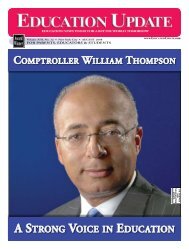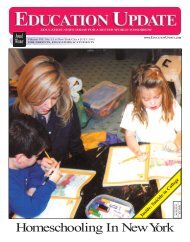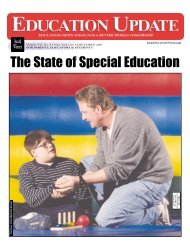12 spotlight on schools ■ EDUCATION UPDATE ■ NOV/DEC 2010Young Ambassador StudentExchange Programby Maya Tadmor-AndermanAs part of a month long exchange programsponsored by the America-Israel FriendshipLeague (AIFL), forty Israeli high school studentstraveled to the United States recentlyon the Youth Ambassador Student ExchangeProgram (YASE). Beginning with a weekof home hospitality in cities across the US,the Israeli students joined youth from NewYork, Arizona, Oklahoma and Virginia for aweek of workshops on cultural understandingand tolerance in the nation’s Capitol.Dr. Charlotte Frank, senior vice-president ofMcGraw-Hill, has played an instrumental role indeveloping and nurturing YASE, ensuring that,what began as a fledgling operation in New YorkCity in 1980 when she was Executive Directorof Curriculum and Instruction at the Departmentof <strong>Education</strong>, extended to other cities across theUnited States.The unforgettable week of activitiesincluded team and leadership workshops,tours of the United States Capitol, a visit tothe national mall and US Holocaust museumto hear from a survivor and a formal dinnerfeaturing Youth Ambassador student alumniand AIFL board members.The next step on the journey took the studentsto New York City visiting the world renownedsites, seeing a Broadway show and getting an indepth look at diplomacy with a tour of the UnitedNations. Students also spent a day at LehmanYouth and Philanthropy InitiativeLast year Marymount School of New York wasthe first U.S. school to take part in the Youth andPhilanthropy Initiative (YPI), an internationalprogram that includes participants from over250 schools in Canada and the United Kingdom.According to Sabra McKenzie-Hamilton, aMarymount School religious studies teacher andClass X advisor, “We adopted YPI because itsupplemented Marymount’s pre-existing socialjustice curriculum, augmenting what was alreadyin place.” In the past, Marymount students studiedlocal social service agencies to develop ideasfor service projects and created action plans toparticipate. YPI added a financial literacy componentto this model.With YPI, Class X students are expected toprepare an in-depth study of a local social issueand find a grassroots agency that raises and usesfunds to tackle that issue. Once the agency isidentified, students must analyze the nuts andbolts of the agency’s budget, just as any informeddonor would do. Ultimately the students aredetermining what it is about a particular agencythat attracts people to fund it. As part of the program,students integrate all of their research onthe social issue, the agency, and its finances toHigh School in the Bronx to share their experienceswith local students. The week of activitiesculminated with a celebration held in their honorbefore the delegation headed to Israel, whereAmerican Youth Ambassadors will live withIsraeli host families and experience Israeli lifeand culture first hand.The goal of YASE is to enable students fromdifferent backgrounds and cultures to build abridge of cross-cultural understanding and longlasting friendships. When you see them gatheredtogether they all look alike, sing together andthe emphasis is always that we are more similarthan we are different. The Youth Ambassadorsreturn energized and excited to maintain theirfriendships and share their experiences with theirrespective surrounding communities through participationin the many AIFL follow up activities.#MARYMOUNT SCHOOL NEWScreate a multimedia presentation promoting their“adopted” agency. Just as agencies must do inthe “real world,” student teams must compete forfunding with other worthy agencies by revealingtheir passion, telling the most compelling story,and representing an informed position, completewith compassion and creativity.Approximately 14 groups are distilled into 4groups that participate in a final round of judgingby an independent panel. The best presentationwins a $5,000 grant to the “winning” agency.The process weaves together multiple disciplinesincluding economics, performing arts (publicspeaking), and religious studies. The programteaches students “to be advocates as they usetheir voices creatively, bring attention to anissue, and encourage others to join,” reflectedMs. McKenzie‐Hamilton.Marymount has been guided in its implementationof the program by the vision and generousfunding of a parent, who seized upon the potentialcareer opportunities that it offers to women.YPI promotes the Marymount mission by presentingstudents with the occasion to practiceethical decision-making as they deal with globalissues at the local level. #Race to NowhereExposes Destructive Impactof Academic PressureBy Gillian GranoffIn her documentary “Race To Nowhere,” VickyAbeles takes a courageous look at the destructiveimpact of today’s excessively rigorous academicclimate on our children. Through profiles ofseveral high school students, the film relays theamount of stress that today’s students feel as aresult of homework, extracurricular activities,MOVIE REVIEWsports, tutors, home chores and other responsibilities.Faced with these crippling demands — andthe pressures associated with them — many ofthese children turn to very adult and destructivebehaviors. Considering the strain and, often, thedamage that students experience as a result of thisacademic lifestyle, Abeles’ film asks: Where isthis path leading us, and is it worth it?FROM THE SUPERINTENDENT’S DESKMake Time For Your Kids,Especially When It’s Toughby Dr. Carole G. Hankinwith Brian SutchOne of the most significant challenges modernfamilies face is finding the time to actually betogether as a family. While technology continuesto draw people closer together through mobilemessaging and social media applications suchas Facebook, the demands of our modern worldcontinually make it more difficult for parentsand children to spend as much time together asthey would like to.We have come a long way from the “idyllic”1950s image of a traditional family: the hardworkingdad, the stay-at-home mom, two kidsand a dog, who meet at the table every morningand evening for family meals. Today’s economyoften requires both parents to work, often forlong hours and on nights and weekends, andsometimes even to travel frequently. Couplethose circumstances with kids’ afterschool andweekend activities, and you have very little timeto have everyone together in one place.The onus is on us, the parents, to maintain thefamily structure. Above all, we need to stay intouch with our kids. No matter how hard a fatheror mother has to work, no matter the stress andthe long hours, a parent has to make the time tobe there. All it takes is a simple time commitment:a standing appointment to spend time withyour children. If you can’t always be there inperson, take advantage of the technology at ourfingertips and make a phone call or send a text80th Birthday CelebrationDr. David Globus celebrated his 80th birthdaysurrounded by family, friends and colleaguesof more than 50 years at the HarmonieClub in New York City. Dr. Globus practicesinternal medicine at the New York-Presbyterian/Weill Cornell Medical Center. Hewas born in Kansas City, Missouri. He graduatedfrom Washington School of Medicine inSt. Louis in 1954. Dr. Globus and his wife,Suellen, have a family of 7 children and 12grandchildren. Mrs. Globus is pursuing abachelor’s degree in psychology and sociologythrough the Hunter BA Program, which shedescribed as a “life changing” experience. #message to let your kids know you’re there andyou care. Write down on the household calendarspecific times you’ll connect with your kids, ormark the time in your planner or smart phonejust as you would with a business meeting. Thiswill show your child that you take these appointmentsseriously and are intent on keeping them.Kids are usually more understanding of our jobdemands than we may think, but they also needto know that they can always reach out to us, andthat we, in turn, will always make the time andeffort to reach out to them as well.One helpful way to encourage deeper conversationis to ask your child to jot down the thingshe or she wants to tell you about. Kids can dothis by keeping a list on their computers or cellphones, or by writing them down the old fashionedway, on paper. This way, even if they haveto wait until late at night or the next day to spendtime with you, their thoughts can still be fresh intheir mind. Parents can do the same!Above all, be creative. Even if you are limitedto a few minutes, make the most out of yourtime with your kids. Instead of limiting the conversationto what they did in school, try sharingfun stories or coming up with games that cancarry over from one conversation time to thenext. Your children will appreciate the effort,and you can both look forward to spending timetogether again. #Dr. Carole Hankin is the superintendent ofSyosset Schools, Long Island, N.Y.Abeles uses profiles of individual students toillustrate the rigors of today’s educational climate.One particularly heartbreaking story was of a youngwoman; she was a straight-A student and talentedmusician, endowed with beautiful blond hair andsparkling eyes — a portrait of perfection in herparents’ and society’s eyes. But her story takes ashocking turn when, without any warning to family,friends or teachers, she takes her own life in order toescape her feelings of inadequacy after failing a test.In subsequent interviews, the parents’ claims to haveseen no signs of their child’s distress are mystifying.Another story documents the steady decline of astudent whose grades begin to suffer as she strugglesto cope with pressure. Overwhelmed by her imperfections,the young woman trades in the demands ofschool for the structure and safety of a treatment centerto recover from the debilitating anxiety she feels.Sadly, these stories are all too common. Studentstoday face pressures to excel not only in the classroom,but also in sports, in music, and in a host ofother spheres, all at a frantic pace. Our children’sexternal achievements have become a blanketdisguising the subtle yet serious symptoms of ourchildren’s deteriorating emotional health.If the creation of this destructive environmentwere a crime, then the culprit, according to the film,is the policies of No Child Left Behind and Raceto the Top, which consider test scores the primarybarometer of successful learning. The emphasis onstandardized tests to define student success has sacrificedlifelong learning in exchange for immediategratification for education bureaucrats and politicians.The film cites experts at Stanford Universitywho challenge the philosophy that more homeworkand increased standardized tests are a substitute fordeeper, more personal learning. Today’s studentsare taught to value memorization and regurgitation,and the associated pressures lead them to shortcuts,medical stimulants, and even cheating as means topass tests and get good grades.Students sprint their way through the academicrace to succeed, but this race, as the film’s titlesuggests, is a race to nowhere. The race to get goodgrades, excel on tests, and become successful students,community leaders, and star athletes compromisesboth the emotional and physical wellbeingof today’s children. The film exposes theneed for today’s educators, parents, administratorsand teachers to step back and re-evaluate the directionand philosophies of our educational system.As a first-time filmmaker, and motivated by herown concerns as a parent, Vicky Abeles deliversher message with compassion and honesty. Bysharing her personal experience as a parent, sheallows her message to touch not only the teachersand students who confront these conflicts butparents as well. The film conveys a powerfulmessage to today’s educators and will resonatewith both a national and international audience. #For more information and upcoming screeningsplease go to www.RaceToNowhere.com
NOV/DEC 2010 ■ EDUCATION UPDATE ■ spotlight on schoolsThe Missing Voicesstudents, and to better prepare young people fortheir future.A paradigm shift is needed. It requires that weradically transform the way we think about childhood,education, human capacity, learning andeven standardized testing.We must begin by working in partnership- teachers, parents, administrators – studentsthemselves – to make school a place that emphasizesthe whole child. A place that offers physical13education, showcases the arts, fosters talents,develops citizen skills, develops lifelong learnersand encourages individual growth of students andteachers and a respect for both. #Vicki Abeles is a New York attorney turned documentaryfilmmaker whose film, Race to Nowhere, isscreening in theaters, schools and community venuesnationwide. Race to Nowhere will play at the92nd Street Y, Saturday, Nov. 13 at 7PM and willbe followed by a facilitated dialogue with Abeles.Good schoolsare the cornerstone of astrong communityby Vicki Abeles &Sara Truebridge, Ed. D.Discussions about quality education and adequatelypreparing students for the future havebecome deafening. Yet the voices from those onthe front lines - teachers, students and parents –are often missing. What would they be saying ifwe could hear them?In the documentary Race To Nowhere, thosein the forefront shed light on how the currentdialogue on education reform. Its narrow definitionof achievement and myopic one-dimensionalfocus on test scores and competition is holdingup a one-size-fits all approach to reform that ishaving crushing, unintended consequences. Kidseverywhere, regardless of their background, areunder a new kind of pressure to perform, the kindof pressure that impacts physical and emotionalhealth and hampers their development.High-stakes testing has taken the place ofmeaningful teaching and learning. The tests satisfythe desire for a simple, quantifiable way tomeasure our schools, teachers and students. Butthe scores tend to reflect parental income and zipcodes rather than how our schools are doing, andthe tests have the effect of narrowing the curriculumand the way it is taught. Testing encouragesa type of thinking that trains students to seekquick results and only a superficial knowledge ofthe material. It ignores those subjects not testedand creates students who have been trained tolook for the right answer instead of developingproblem solvers.Teachers are pressured to teach to a script ratherthan to teach for engagement and understanding.They are forced to cover a broad range ofmaterial quickly and without regard to what theyknow as professionals about education and thedevelopmental needs of the children. Many arefeeling unsupported and leaving the profession.Testing also ignores the importance of activeand engaged participation of students in thelearning process. Motivation to learn for pleasureor even to continue in school at all is alsoimpacted. As our classrooms have been turnedinto test prep centers, an increasing number ofstudents are becoming disengaged, checking outand dropping out.And this environment promotes fear withinyoung people preventing them from taking risksand from involving themselves with learning.Today’s students need room to make mistakes—mistakesprovide important opportunitiesfor growth.A toll is also exacted on the health and wellbeingof our youth. There’s an epidemic ofyoung people who are anxious, depressed andsleep deprived, exhibiting psychosomatic symptoms,abusing performance medications, andcompromising values because of the pressure toget the grade or simply to get through the quantityof material.Accustomed to a regime of memorizing, crammingand regurgitating information, many entercollege lacking effective problem-solving orthinking skills. Over 40 percent of college freshmenhave to take remedial courses. And mentalhealth offices on campuses are overflowing.Business leaders tell of young people who lackthe skills needed most to thrive in the adult world–working together cooperatively, communicatingand solving complex problems. Having beentrained, instead of educated, in such a narrowmanner, young people are afraid to take risksneeded for innovation and they also lack thecreativity of previous generations. Industry isspending billions retraining these graduates.Much of the attention given to improvingschools has focused on raising standardized testscores and promoting the latest program, keepingstudents in school for longer hours and increasingtime devoted to homework and studying. Ratherthan doing more of what we’ve always done,improving educational success must be groundedin a deeper understanding of how schools canbe restructured to make learning more relevantand engaging, to provide access to quality educationfor all children, to provide opportunitiesfor experiential learning, to allow time formeaningful relationships between educators andIn times like these, we need to build up our communities by investingin public education, rejecting shortsighted gimmicks that hurt studentsand challenging naysayers who lack the facts.A recent poll showed what we already knew: New Yorkers overwhelminglysupport their schools. Working together, we can face the challenges ahead,give our kids a brighter future and build stronger communities.Quality public educationA great investment for our statePaid for byNew York State United Teachers.Discover MarymountMarymount School of New York1026 FIFTH AVENUE, NEW YORK, NY 10028 212.744.4486 WWW.MARYMOUNTNYC.ORG
















